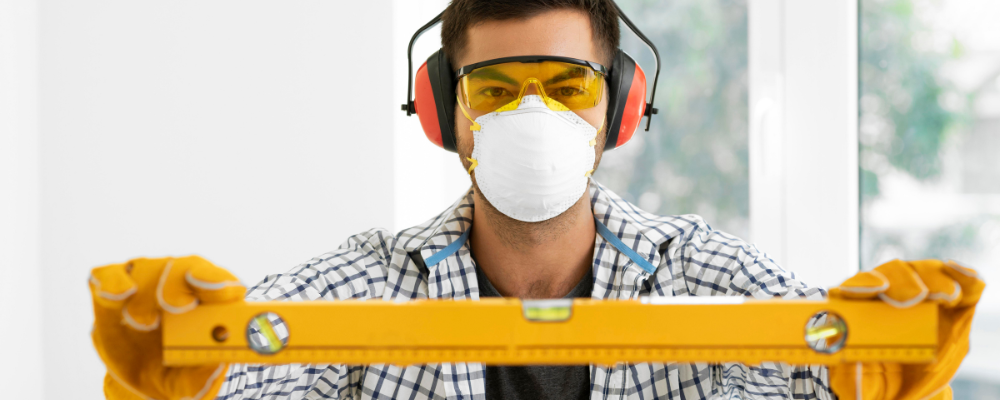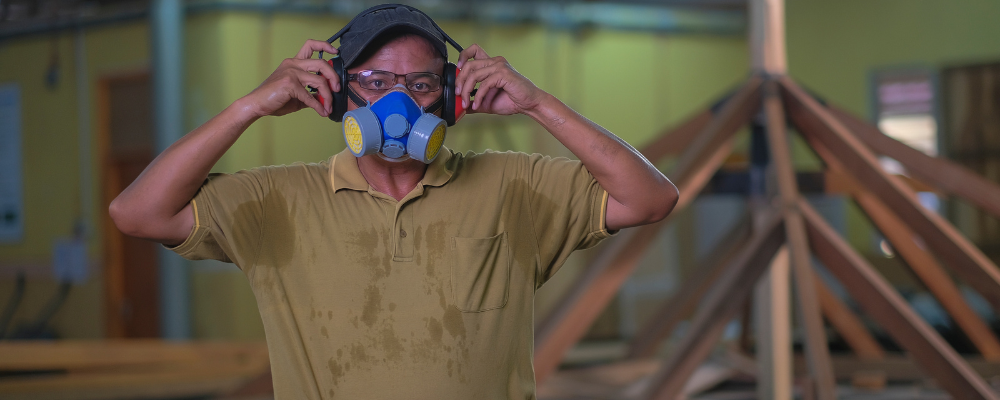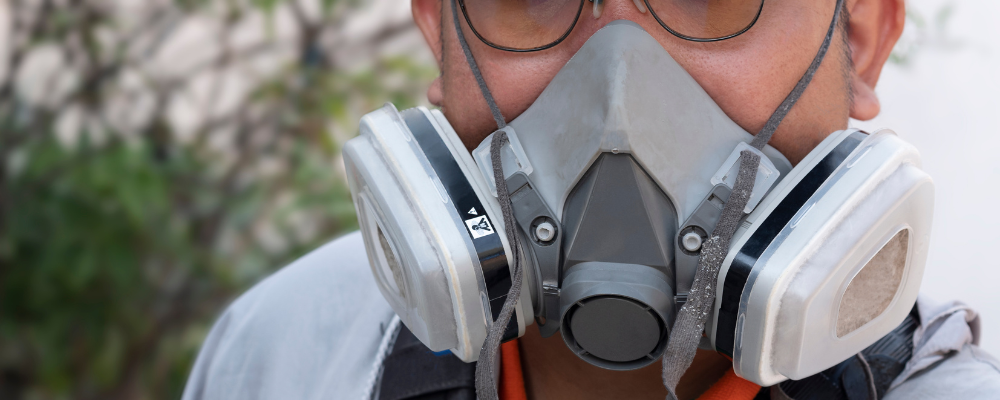
Introduction
Ventilated Masks are an indispensable line of defense, mitigating these airborne particles’ dangers. Moreover, construction work demands masks that provide optimal protection and ensure comfort and usability. Ventilated masks, designed specifically for construction settings, balance efficient filtration and ease of use, allowing workers to carry out their tasks comfortably without compromising safety.
In essence, using ventilated masks in construction isn’t merely a precaution; it’s an essential tool in protecting workers from the myriad respiratory hazards in their working environment. These specialized masks serve as a frontline defense, safeguarding construction workers’ health and well-being amidst challenging daily conditions.
Understanding the Need for Ventilated Masks in Construction
In the demanding environment of construction sites, ensuring the safety and well-being of workers is paramount. One of the most critical aspects of this safety protocol revolves around respiratory protection. Construction sites are rife with various airborne hazards, including but not limited to dust, fumes, chemical particles, and other pollutants. These elements pose severe health risks to workers when inhaled over extended periods.
The need for specialized ventilated masks in construction cannot be overstated. Unlike standard masks, ventilated masks offer higher protection by effectively filtering out a broader spectrum of particles and contaminants. They are engineered to meet the rigorous demands of construction environments, where exposure to hazardous airborne substances is routine.
Construction workers often operate in areas where dust from concrete, wood, metal particles, and other debris is prevalent. Additionally, they might encounter hazardous substances like asbestos or silica, which, when inhaled, can lead to severe respiratory issues and long-term health complications. Ventilated masks act as a formidable defense, mitigating the inhalation of these harmful elements and safeguarding workers’ health.
Types of Ventilated Masks Offered by Site and Safety Solutions
-
CH RESPIRATOR KN95 WHITE
The CH Respirator KN95 White mask stands as a pinnacle in respiratory protection, meticulously designed to address the unique challenges construction workers face. Crafted with precision, it boasts various features tailored explicitly for the demanding construction environment.
Key Features:
Filtration Excellence: The CH Respirator KN95 White incorporates multi-layered filtration technology, ensuring the interception of up to 95% of airborne particles, including dust, pollutants, and microorganisms, safeguarding the wearer’s respiratory health.
Comfort-Centric Design: Its ergonomic design prioritizes comfort without compromising on functionality. The adjustable nose clip and elastic ear loops guarantee a snug fit, reducing discomfort during extended wear on construction sites.
Durable Build: Constructed with high-quality materials, this respirator withstands the rigors of construction work, offering durability and reliability in harsh conditions.
Tailored for Construction Needs:
In the construction industry, where exposure to hazardous particles is a daily concern, the CH Respirator KN95 White emerges as an indispensable shield. Its superior filtration efficiency and comfortable fit ensure that construction workers can confidently execute their tasks, knowing their respiratory health is safeguarded.

-
North P100 Safety Particulate Filter 7580P100 – 1 Pair
The North P100 Safety Particulate Filter 7580P100 redefines safety standards in heavy-duty construction environments, providing unparalleled protection against a spectrum of airborne particulates.
Noteworthy Attributes:
Exceptional Filtration Capability: Engineered with cutting-edge filtration technology, this filter captures 99.97% of airborne particles, setting a new benchmark in filtration efficiency.
Versatile Application: Designed as a detachable filter compatible with various respirator models, it offers versatility and ease of use, seamlessly integrating with existing safety gear.
Longevity and Reliability: Its durable construction ensures prolonged usage, maintaining consistent filtration performance over time, even in the most challenging construction settings.
Suitability for Construction Environments:
In the construction realm, where dust, fumes, and microscopic particles abound, the North P100 Safety Particulate Filter 7580P100 emerges as the guardian of respiratory health. Its superior filtration prowess and adaptability make it an indispensable asset for workers navigating hazardous construction zones.
-
Honeywell 7700 Series Half Mask Respirator 770030
The Honeywell 7700 Series Half Mask Respirator 770030 embodies the fusion of cutting-edge design and uncompromised protection, catering specifically to the safety needs of construction workers.
Salient Features:
Innovative Design: Engineered with precision, its design ensures a secure yet comfortable fit, reducing pressure points and enhancing wearability for prolonged periods.
Optimized Airflow: The respirator’s design facilitates efficient airflow, reducing breathing resistance and minimizing heat buildup within the mask.
Customizable Options: With multiple sizes available and adaptable accessories, this respirator caters to diverse facial contours and preferences, ensuring a personalized fit for every wearer.
Protection Tailored for Construction:
The Honeywell 7700 Series Half Mask Respirator 770030 represents a pinnacle in respiratory safety. Its innovative design, coupled with enhanced comfort and adaptability, serves as an indispensable shield for construction workers, offering unparalleled protection without compromising on comfort or performance.
Benefits of Ventilated Masks in Construction Environments
Construction sites are fraught with airborne hazards, making ventilated masks a crucial asset for workers. These masks offer a myriad of advantages, enhancing both safety and work efficiency:
- Improved Air Quality:
Ventilated masks effectively filter out dust, pollutants, and particulate matter, significantly enhancing the air quality that workers breathe in.
They prevent inhalation of harmful substances, reducing the risk of respiratory ailments caused by prolonged exposure to construction-related pollutants. - Reduced Health Risks:
By providing a barrier against airborne particles, ventilated masks minimize the risk of developing respiratory issues, allergies, and other health complications.
Workers are shielded from inhaling contaminants like silica dust, asbestos fibers, and other hazardous materials, safeguarding their long-term health. - Enhanced Productivity:
With improved air quality and reduced health risks, workers experience increased comfort and focus while on the job.
Uninterrupted work due to respiratory issues is minimized, leading to heightened productivity and efficiency on construction sites. - Prolonged Mask Usage Comfort:
Ventilated masks are designed with comfort in mind, ensuring prolonged usage without causing discomfort or hindering breathing.
Their ergonomic design and adjustable features allow for a snug fit, preventing air leakage while maintaining worker comfort during extended wear. - Long-Term Cost Savings:
By investing in quality ventilated masks, construction companies can reduce healthcare costs associated with respiratory illnesses among workers.
Additionally, the durability of these masks leads to longer lifespans, reducing the frequency of replacements and saving on operational expenses.
Ventilated masks are indispensable tools in the arsenal of safety gear for construction workers. Their multifaceted benefits protect workers’ immediate health and contribute to long-term well-being and operational efficiency on construction sites.
Importance of Proper Ventilated Mask Maintenance
Ventilated masks are vital protective gear for construction workers, ensuring their respiratory safety amid hazardous environments. Proper maintenance is crucial to maximize the efficacy and lifespan of these masks, guaranteeing optimal performance throughout their use.
Why Maintenance Matters:
Preserve Filtration Efficiency: Regular cleaning helps prevent the buildup of dust, debris, and contaminants on the mask’s filters, ensuring consistent and efficient filtration of harmful particles.
Enhances Durability: Maintenance routines, such as cleaning and inspection, contribute to extending the lifespan of the mask, reducing the need for frequent replacements, and saving costs in the long run.
Promotes Comfort and Fit: Cleaning ensures the mask remains comfortable and maintains a proper seal, preventing discomfort or compromised protection due to an improper fit.
Maintenance Practices for Ventilated Masks:
Regular Cleaning:
Use mild soap or designated cleaning solutions recommended by the manufacturer.
Gently wash the mask components, including the filters, straps, and mask body, following the instructions.
Thoroughly rinse and allow the components to air dry completely before reassembly.
Inspection and Replacement:
Routinely inspect the mask for signs of wear, tear, or damage, such as frayed straps or cracked components.
Replace damaged or worn-out parts promptly to maintain the mask’s integrity and effectiveness.
Storage and Handling:
Store masks in a clean, dry, and well-ventilated area to prevent moisture buildup and contamination.
Avoid exposing masks to extreme temperatures or direct sunlight, which can degrade their materials and performance.
Frequency of Maintenance:
Daily Inspection: Conduct a brief visual check before and after each use to ensure the mask is in good condition.
Regular Cleaning Schedule: Follow the manufacturer’s recommendations for cleaning frequency, typically ranging from daily to weekly cleaning based on usage intensity.
Replacement Schedule: Adhere to the manufacturer’s guidelines for replacing filters, straps, or other components. However, immediate replacement is necessary if damage or decreased performance is observed.
Proper ventilated mask maintenance is a proactive measure to guarantee effectiveness, comfort, and longevity. By integrating regular maintenance practices into the usage routine, construction workers can ensure consistent protection against airborne hazards and maintain a safer work environment.
Tips for Selecting the Right Ventilated Mask
Construction workers operate in environments filled with dust, chemicals, and other airborne hazards. Choosing the appropriate ventilated mask is essential for their safety and well-being. Consider the following factors when selecting these masks:
1. Fit:
a. Seal and Comfort: The mask should create a secure seal around the face to prevent any ingress of particles. A proper fit ensures that air passes through the filtration system, not around the edges of the mask.
b. Adjustability: Look for masks with adjustable straps or mechanisms that allow customization for different face shapes and sizes.
2. Filtration Efficiency:
a. Particle Size: Evaluate the mask’s efficiency in filtering varying-sized particles, especially those commonly encountered in construction environments. Masks are rated based on their ability to filter different particle sizes.
b. Filter Replacement: Consider masks with quickly replaceable filters to maintain optimal filtration efficiency over time.
3. Comfort:
a. Breathability: Construction work often requires physical exertion; hence, the mask should allow easy breathing without causing discomfort or restriction.
b. Material Quality: Opt for masks made from lightweight, breathable, durable, and suitable for extended wear.
4. Compliance with Safety Standards:
a. Certification: Ensure the mask complies with industry standards (e.g., NIOSH, OSHA) for respiratory protective equipment. Look for certifications indicating adherence to safety norms.
b. Hazard-specific Consideration: Different construction tasks might pose specific respiratory hazards; choose masks to address these risks.
For more information, visit our Facebook page.
For more products, visit our website.
North P100 Safety Particulate Filter 7580P100 – 1 Pair
Honeywell 7700 Series Half Mask Respirator 770030
Honeywell North 7600 Series Niosh Approved Full Face Respirator Dual Cartridge Silicone 760008A
Conclusion
Selecting the right ventilated mask for construction involves balancing protection, comfort, and compliance. Workers should prioritize masks that fit securely, offer high filtration efficiency, provide comfort during extended wear, and adhere to safety standards.
Choosing the most suitable mask not only safeguards the health of construction workers but also enhances their productivity and overall well-being in hazardous environments.










